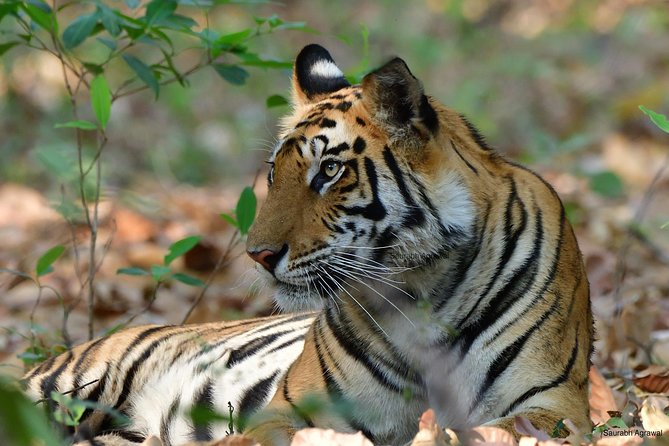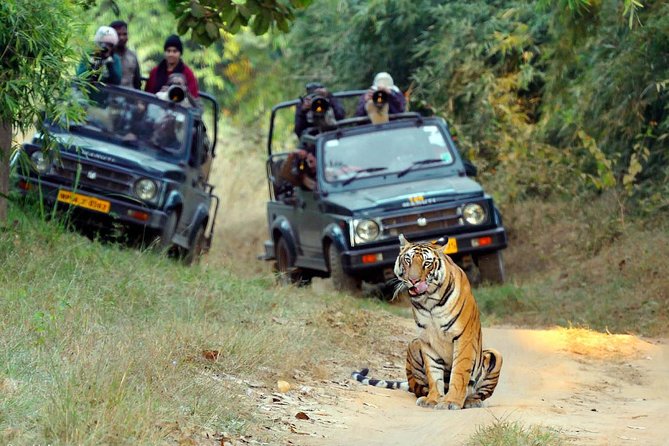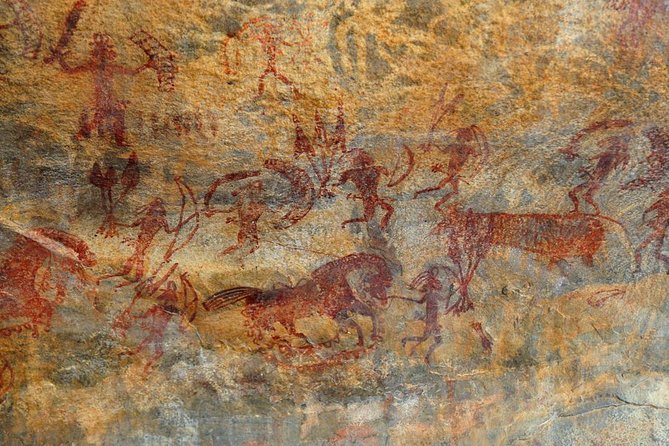Central India’s wildlife captivates with its rich diversity and unique ecosystems, drawing attention to iconic species like the Bengal tiger and the elusive leopard. Renowned national parks such as Bandhavgarh and Kanha serve as vital sanctuaries, not only for these magnificent creatures but also for a myriad of other flora and fauna. As conservation efforts gain momentum, the region’s importance as an eco-tourism destination becomes increasingly clear. What challenges do these habitats face, and how do they impact the delicate balance of life in Central India?
Key Points

- Central India is home to iconic species such as Bengal tigers, leopards, and sloth bears within diverse ecosystems and lush forests.
- Major national parks like Bandhavgarh and Kanha offer rich habitats and conservation efforts, attracting eco-tourism and wildlife enthusiasts.
- Birdwatching opportunities abound, especially in Kanha and Bandhavgarh, with guided tours enhancing the experience of observing diverse avian species.
- Conservation initiatives focus on habitat preservation, anti-poaching, and community involvement to protect Central India’s unique wildlife.
- Cultural beliefs in India often emphasize the significance of wildlife, reflecting a deep connection between nature and heritage.
Overview of Central India Wildlife

Central India’s wildlife thrives in its lush forests and diverse ecosystems, making it a prime destination for nature enthusiasts eager to spot iconic species like tigers and leopards.
This region boasts a rich variety of habitats, including dense jungles, grasslands, and riverine forests, each supporting unique flora and fauna.
Visitors can also encounter sloth bears, wild dogs, and numerous bird species, from majestic eagles to colorful kingfishers.
The intricate balance of these ecosystems supports successful breeding programs for endangered species, ensuring their survival.
Central India’s commitment to conservation efforts further enhances its reputation as a wildlife haven.
You can also read our reviews of more tours and experiences in New Delhi
Major National Parks

Home to some of India’s most renowned wildlife reserves, the major national parks in this region offer incredible opportunities for visitors to witness the majestic creatures that roam their expansive landscapes.
Bandhavgarh National Park, famous for its tiger population, captivates nature enthusiasts with its stunning scenery and rich biodiversity.
Kanha National Park, another gem, provides a habitat for the rare barasingha and boasts lush sal forests.
Tadoba Andhari Tiger Reserve stands out for its successful conservation efforts, allowing guests to spot leopards and sloth bears.
Each park features well-maintained trails and knowledgeable guides, ensuring a memorable experience.
With diverse ecosystems, these parks not only protect wildlife but also promote eco-tourism, fostering a deeper appreciation for Central India’s natural heritage.
Iconic Wildlife Species
In the heart of India’s national parks, visitors can encounter iconic wildlife species such as the majestic Bengal tiger, elusive leopards, and fascinating sloth bears, each playing a vital role in the region’s rich biodiversity. These species not only represent India’s wildlife heritage but also contribute to the ecological balance within their habitats.
| Wildlife Species | Unique Traits |
|---|---|
| Bengal Tiger | Apex predator, strong territorial instincts |
| Leopard | Adaptable, excellent climber |
| Sloth Bear | Omnivorous, known for unique feeding behavior |
Exploring Central India offers a chance to witness these remarkable animals in their natural environments, making it an unforgettable experience for wildlife enthusiasts and nature lovers alike.
Birdwatching Opportunities
Birdwatchers will find a treasure trove of avian species flourishing in the diverse ecosystems of India’s national parks and reserves. From the vibrant Indian Peafowl to the elusive Malabar Grey Hornbill, the region boasts an impressive variety of birds.
Each park offers unique opportunities, with Kanha and Bandhavgarh being particularly renowned for their rich birdlife. Early morning excursions provide the best chances to spot species such as the Crested Serpent Eagle and the Great Indian Horned Owl.
Guided birdwatching tours enhance the experience, as local experts share insights about each species’ behaviors and habitats. Enthusiasts can also enjoy picturesque backdrops, making photography a rewarding aspect of their birdwatching adventures in Central India.
Unique Ecosystems and Habitats
Central India’s diverse ecosystems and habitats support a rich tapestry of wildlife, offering visitors a chance to explore everything from lush forests to arid grasslands. The region’s unique environments play a crucial role in sustaining various species, each adapted to their specific surroundings.
| Ecosystem Type | Main Wildlife Species |
|---|---|
| Tropical Rainforest | Tigers, leopards, and sloth bears |
| Deciduous Forest | Indian bison, deer, and wild boar |
| Grasslands | Wild dogs, jackals, and various birds |
Each habitat provides essential resources for wildlife, showcasing the intricate balance of nature. Exploring these ecosystems enables visitors to witness the stunning diversity and beauty of Central India’s wildlife, making it an unforgettable experience.
- Private Taj Mahal at Sunrise and Agra Day Tour From Delhi
- Private Old and New Delhi Tour – Best of Delhi in 8 Hours With Entrances
- 6-Day Private Tour of the Golden Triangle
- Private Taj Mahal Day Trip by Express Train With Lunch
- Taj Mahal Skip the Line Luxury Tour With Guide
- Taj Mahal Private Day Trip by Express Train With Lunch
Conservation Efforts
Efforts to protect wildlife in this region focus on habitat preservation and anti-poaching initiatives, ensuring that species like tigers and leopards thrive in their natural environments.
Conservation organizations collaborate with local communities to promote sustainable practices and raise awareness about the importance of biodiversity.
Plus, wildlife corridors are established to connect fragmented habitats, allowing animals to roam freely.
-
Anti-poaching patrols equipped with technology monitor protected areas.
-
Community-based programs educate locals on wildlife conservation.
-
Initiatives restore native vegetation to support ecosystem health.
These combined efforts not only safeguard the wildlife but also foster a sense of responsibility among residents, contributing to a more balanced coexistence between humans and nature in Central India.
Travel Tips for Wildlife Tours
When planning a wildlife tour, travelers should consider several key tips to enhance their experience and ensure a safe, enjoyable adventure in the heart of nature.
First, they should pack lightweight, breathable clothing in neutral colors to blend into the environment. Binoculars and a good camera will help capture unforgettable moments.
Travelers must also stay hydrated and carry snacks for long safari rides. It’s wise to book guided tours with experienced naturalists who know the area well.
Lastly, respecting wildlife and maintaining a safe distance is crucial for both safety and conservation.
Cultural Significance of Wildlife

Wildlife holds deep cultural significance in India, symbolizing not only the country’s rich biodiversity but also its spiritual beliefs and traditional practices. Many communities revere animals, viewing them as symbols of various deities and integral to their identity.
Sacred animals like cows and elephants play essential roles in rituals and festivals.
Wildlife conservation efforts often stem from cultural narratives that depict nature as interconnected with human life.
Traditional art forms, such as Madhubani and Warli, frequently feature animals, reflecting their importance in local heritage.
This connection fosters a sense of responsibility among people to protect these species, ensuring that wildlife remains a vital part of India’s cultural landscape for generations to come.
Recap
To sum it up, Central India’s wildlife offers a remarkable tapestry of biodiversity, attracting nature lovers and adventurers alike.
Its national parks, home to iconic species and unique ecosystems, play a crucial role in conservation efforts.
With abundant birdwatching opportunities and rich cultural ties to the land, this region invites exploration and appreciation.
By visiting, one not only witnesses the splendor of Central India’s wildlife but also contributes to ongoing conservation initiatives, ensuring these natural treasures endure for future generations.
More Wildlife Experiences in New Delhi
- Delhi: Taj Mahal Sunrise Tour Wildlife Elephant Conservation
- From Delhi: Sunrise Taj Mahal and Elephant Wildlife SOS Tour
- Golden Triangle With Ranthambore Wildlife Tour (06 Days)
- Wildlife and Cultural India Tour
- From Delhi: 3 Day Golden Triangle W/ Elephant Wildlife Tour
- 2-Night Private Ranthambore National Park and Wildlife Tour From Delhi
More Tour Reviews in New Delhi
- 6-Day Private Tour of Delhi, Agra, Jaipur, and Varanasi from Delhi
- Private Sunrise Taj Mahal Tour from Delhi By Car -All inclusive
- Overnight Taj Mahal & Agra Fort Tour From Delhi
- India Tour With Pottering: a Complete Review
- From Delhi: 6-Day Golden Triangle Tour With Ranthambore
- Delhi: Old and New Delhi Guided Full or Half-Day Tour
Not for you? Here's more nearby things to do in New Delhi we have reviewed
- 6-Day Private Tour of Delhi, Agra, Jaipur, and Varanasi from Delhi
- Private Sunrise Taj Mahal Tour from Delhi By Car -All inclusive
- Overnight Taj Mahal & Agra Fort Tour From Delhi
- India Tour With Pottering: a Complete Review
- From Delhi: 6-Day Golden Triangle Tour With Ranthambore
- Delhi: Old and New Delhi Guided Full or Half-Day Tour
- From Delhi: Sunrise Taj Mahal, Agra Fort & Baby Taj Day Trip
- From Delhi: Taj Mahal Sunrise, Agra Fort, and Baby Taj Tour
- Delhi to Agra: Taj Mahal & Agra Fort W/ Option of Entry Fee
- See Fatehpur Sikri, Bharatpur Bird Sanctuary With Delhi Drop
- Golden Taj Tours (Delhi – Agra – Jaipur)
- Delhi Airport to Airport: Guided Layover Delhi City Tour
